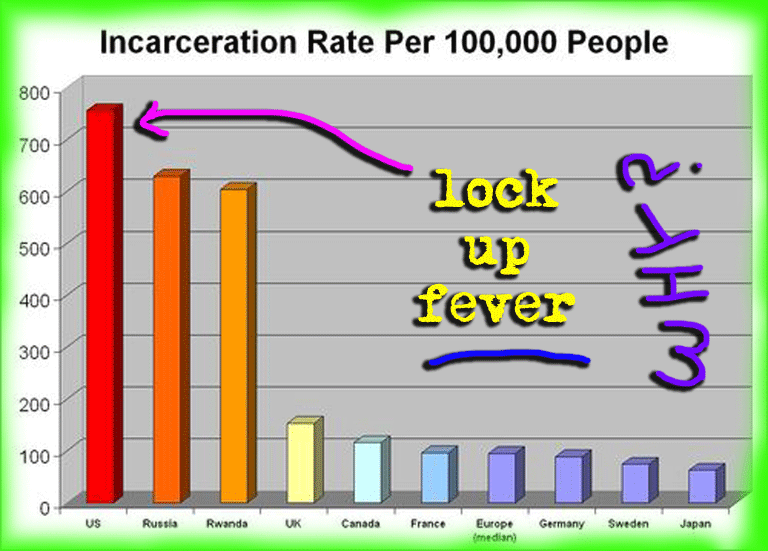CRUEL & UNUSUAL: U.S. SENTENCING PRACTICES VS. EVERYBODY ELSE
by Matthew Fleischer
In October of last year, a 26-year-old Naples, Florida man named Daniel Enrique Guevara Vilca was sentenced to life in prison. Despite the gravity of his sentence, Vilca was no murderer. He hadn’t assaulted or raped anyone. Vilca was convicted of possession of 454 images of child pornography. The prosecution treated each photograph as a separate crime. Vilca received a 154-year sentence when all his crimes were stacked on top of one another. His sentence was longer than it would have been if he had actually molested a child.Vilca certainly isn’t the only American serving a Kafka-esque sentence for a non-violent crime. You’ve probably heard the stat before, but 730 out of 100,000 people are currently behind bars in the United States–a rate 6 times higher than authoritarian China. Rwanda—which less than two decades ago saw upwards of 1 million people slaughtered in the streets in a genocidal bloodbath by their neighbors—only has 595 out of 100,000 people in prison. Most of us have some idea that the United States is an outlier when it comes to our astronomical rates of incarceration. But a new report released this week by the University of San Francisco School of Law’s Center for Law and Global Justice puts those numbers in a true global context. The authors surveyed the criminal justice laws of all 193 member states of the United Nations—and the results were shocking.
“There’s a reason we have the incredible prison population that we do, and it’s not because of higher crime,” says Amanda Solter, one of the report’s authors who spent nearly two years studying international sentencing laws. “It’s because of our sentencing policies—the majority of which were implemented the last 30 years.”
There’s plenty gone haywire in our sentencing laws, but a big part of the problem is that the U.S. is categorically alone in its propensity to lock up children. According to the report, there are an estimated 2,594 juveniles offenders serving life without parole sentences in the U.S. and zero in the rest of the world. “Argentina is one of the few countries aside from the U.S. whose law allows for such sentences,” explains Solter, “they just don’t actually sentence anyone. And if they did, the sentence would be overturned in court.”
That’s because Argentina signed the international Convention on the Rights of the Child treaty—which prohibits sentencing juveniles to life without parole. International treaties take precedence over domestic law in Argentina’s constitution.
The CRC treaty also stipulates no child under 12 should be held criminally responsible for their actions. The U.S. has no such age limit. Any one of the 92,000 juveniles currently in detention in the U.S. can be tried as an adult—no matter their age.
Incidentally, Somalia and South Sudan are the only countries in the world that, along with the U.S., elected not to sign the CRC treaty. Nice company.
The U.S. is also part of the minority group of countries—21 percent of the world’s nations-–that allow “uncapped” consecutive sentencing like the kind that put Daniel Vilca in prison for 154 years multiple counts of the same non-violent crime. The vast majority of countries around the world allow for enhanced sentencing for multiple counts of the same offense, but within limits—with “capped” maximum sentences. In Switzerland, for example, Vilca would have received the maximum sentence allowed for one count of possession of child porn, and then had his sentence bumped by 50 percent for the additional counts.
Perhaps most interesting is how the U.S. deals with retroactive application of ameliorative law—meaning how prisoner sentences are dealt with when legislators revise the sentencing guidelines. Unlike 66 percent of the world, the U.S. has no law that guarantees prisoners the right to ameliorative relief once they’ve been convicted.
For instance, if Congress were to outlaw the death penalty overnight, current death row inmates could still be executed—unless Congress (or a state legislature, if the change is on a state level) explicitly states the law applies retroactively. This is rare, says Solter: “New Mexico recently abolished the death penalty but it doesn’t apply to current death row inmates.”
In Connecticut, which is the latest state to do away with the death penalty, the situation is the same; despite the change for everyone who comes after, those on death row, will stay on death row.
Here in California, our state Supreme Court has ruled that retroactive amelioration should apply implicitly if legislators leave the issue unspecified. But legislators are within their rights to specify that laws won’t apply retroactively. If the state decides to decriminalize marijuana trafficking, for instance, there’s no guarantee any current weed offenders would be let out of prison.
And of course there is California’s infamous “three strikes” law—which can put an offender away for life for a trivial, nonviolent offense if that offender has two previous “strikes,” even if those strikes are 20 years in the offender’s past. While most countries around the world authorize enhanced penalties for repeat offenders, only 33 countries take away judicial discretion in sentencing like California does. Japan is the only first world country among this group, which includes, Cuba, Venezuela, Sudan and The Philippines. Not exactly bastions of democracy.
“Individually–with the exception of the juvenile stuff–when you look at a lot of these issues they’re not that shocking,” says Solter. “But when you step back and see how alone we are in using all of these controversial policies in conjunction with one another, it’s astonishing. We can’t even afford it and yet we still continue to do it.”
There’s a whole lot more worth reading in the report. Check it out in full here.

